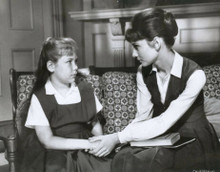 Loading... Please wait...
Loading... Please wait...New Products
Our Newsletter
Product Description
The Children's Hour (1961)

Product Reviews
-
This somber, hopefully outdated, drama is nobody's finest "hour":

Posted by DEWEY on Feb 7th 2024
Lillian Hellman's "The Children's Hour" shocked theatergoers so much in 1934 that the film adaptation in 1936, retitled "These Three", was heavily censored. Still, director William Wyler got compelling performances from Miriam Hopkins, Merle Oberon, and Joel McCrea as three people whose lives are destroyed when bratty schoolgirl Mary (Bonita Granville) implicates they are involved in a heterosexual love triangle. Granville even received an Academy Award nomination as Best Supporting Actress.
By 1961, Wyler felt he was ready to give the story another go in an "uncensored" version true to the original play. So, "The Children's Hour" came to the screen with its original title and "shock value" (and homophobia) intact. But an "uncensored" version is not necessarily the "better, superior" version. Wyler fares much worse the second time around. The drama isn't even half as compelling. Wyler wasn't ready to tackle the material sensitively, and neither was Hollywood.
Karen Balkin, as Brat Mary from Hell, proves she is definitely NOT Bonita Granville. Balkin is an annoying brat who is never a compelling actress. This time around, Brat Mary tells her Grandmother (Fay Bainter) that the teachers at her school, Martha and Karen (Shirley MacLaine and Audrey Hepburn) are lesbians. Grandmother, on hearing the vaguest hint of innuendo from Martha's unsupportive Aunt Lily (Miriam Hopkins, who played Martha in 1936's "These Three"), spreads the rumor and all the parents immediately remove the children from school. Mary resorts to blackmailing another girl, (Veronica Cartwright) forcing her to back up the increasingly convoluted web of lies.
Most of the actors perform as if they are "breaking new and important cinematic ground." Neither Shirley MacLaine or Audrey Hepburn are helped by Wyler's unenlightened approach to the material. James Garner, as Karen's increasingly suspicious boyfriend Joe, is largely unnecessary and left to just stand there and wonder if Martha and Karen are (gasp!) lesbians after all.
Audrey Hepburn, of course, looks sympathetic and pained. Shirley MacLaine is shrill throughout-- right up to her heartbreaking confession to Audrey ("I feel so damn sick and dirty!"). In the documentary "The Celluloid Closet", MacLaine admits that she, Audrey, and Wyler never discussed the emotional or psychological implications of Martha's heartbreaking speech, and they made the "wrong picture." This is definitely a difficult film for LGBTQ+ audiences today.
Still, the somber drama is well served by the Black and White photography. And audiences can ponder who the real "villain" of the piece is. Mary is an evil, vindictive brat, and Grandmother is terrible for quickly spreading unsubstantiated rumors. But society seems to be the real villain here-- any society quick to believe lies and gossip, and quick to judge others harshly.
Currency Converter
Choose a currency below to display product prices in the selected currency.















